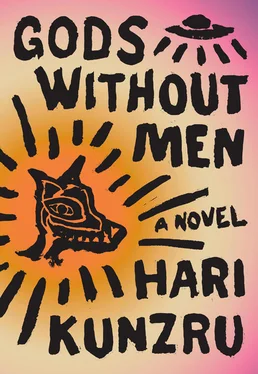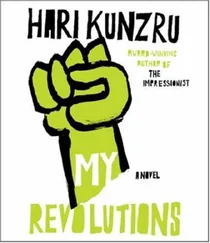At dawn he endured a shattering bout of coughing. His chest felt like it was on fire, and there was blood in the filthy handkerchief he tugged out of his pocket and pressed against his mouth. He’d known for a while that the desert air wasn’t having the effect the doctors had hoped. In his firm opinion, good health was largely a matter of mental attitude; he refused to become one of the prematurely aged, neurasthenic scarecrows he’d seen hobbling about the veterans’ hospital in New Jersey. They were men who’d left the best part of themselves in France.
He found Eliza brewing coffee. Wordlessly, she handed him a tin mug. They drank together companionably, and it was like the early days when he first brought her out to the desert, when he thought he’d found a companion.
“What now, Eliza?”
“I don’t know.”
“I have to go back to town. Will you come?”
“No.”
“I see. And what do you propose to do out here in the wilderness?”
“I will shift for myself, I suppose.”
“That’s not a practical suggestion, not for an unprotected white woman.”
“That never seemed to concern you before.”
“You’re under my protection.”
“Really, David? I’ve never felt very protected.”
“Where will you go? How will you live?”
“Does it matter to you?”
“I must ask. Are you — this Willie Prince …” He couldn’t make the words come out.
“He’s a good man, David. A kind man. You were many things to me, but you were never kind.”
He could, he supposed, have talked to her about love, tried to woo her back. But that sort of thing had always seemed ridiculous. He’d never been able to play that character, the stage-door Johnny. Even when he still had all his face.
He went to the car, only to discover that the rest of his food had gone. There’d be nothing for breakfast, and it would be early afternoon before he made it back to town for a hot meal. A little gang of children watched him rummage in his footlocker. He knew they were probably the thieves, and though it broke all his rules — about decorum, about maintaining a good relationship with one’s informants — he found himself screaming at them, calling them degenerates, street Arabs, nonsensical insults that diminished him even as they came out of his mouth. Of course they just stared impassively until he’d worn himself out and collapsed into another fit of coughing. Angrily he cranked the starter on the Ford. The car was unhappy in the cold, but caught after a minute or two, the chassis juddering as he hunched in the driver’s seat and released the brake. He headed out of the camp, watched as he passed the communal trash heap by a little girl clutching an open can of corned beef, spooning out greasy chunks with her fingers.
He bumped his way along the track, following twin ruts he’d made more or less entirely himself in the months he’d been coming to Kairo. Gradually he picked up speed, his journey punctuated by evenly spaced creosote bushes. He’d often wondered about the gridlike regularity of their growth, something to do with the limited water supply; each kept the same considerable distance from its neighbors, like homesteaders on forty-acre plots. As he drove on, the circulation returned to his face and hands. The morning was crisp and bright, the hills the color of honey. He began to feel better, and regretted he’d lost his temper with the children. By the time he reached the main road and the first of the new cabins, he was humming snatches of doughboy marching songs, honking the horn for emphasis: smile! — smile! — smile!
He reached town earlier than expected and ran the car up in front of Mulligan’s Hotel, grunting a hello to the rheumy-eyed old clerk, who was sitting in his usual guard-dog position on the porch, studying a newspaper with the aid of a magnifying glass. As usual his room smelled like something had died under the floorboards. Deighton accepted full blame; the chambermaid, a timid Mexican girl of fourteen or so, had refused to touch it since he’d shouted at her for disturbing his papers.
He gulped down a cup of lukewarm water from the jug on the washstand and stripped down to his underwear, throwing his clothes over the pyramid of boxes that took up most of the floor space. Their contents, thousands upon thousands of index cards, some covered in his tiny backward-slanted handwriting, some in Eliza’s loops and whirls, represented the fruits of a year’s hard labor. Most of them were notes on the group of Uto-Aztecan languages he’d been studying, a card for each word or word stem, each distinct element of grammar. Others dealt with the People’s material culture, their philosophy, the fragments they still remembered of their old songs. His employer, the Bureau of American Ethnology, had given him a six-month grant to write a preliminary report, with a vague promise of more money if the findings were interesting. So far, through extreme frugality, he’d managed to make the money last twice the scheduled time. Eliza had complained about the poor rations and his absolute prohibition on fripperies, but he thought she’d grasped the importance of their sacrifice. It really was too bad that she’d fallen by the wayside. The time and effort he’d invested in training her had gone to waste.
Though Washington had little real interest in the ethnology of the Mojave, they liked the idea of sending a decorated veteran to a place where he might recover from his injuries. Before he volunteered for France, Deighton had worked with coastal tribes in Oregon and Washington state (it was his proud boast that he knew more about the mythology of salmon than any white man alive), but the doctor at the veterans’ hospital had told him the Northwest was out of the question. “All that rain and fog? You’d be dead within a year.” Deighton had worried the man would tell him he’d go blind. At the field hospital in Château-Thierry he’d spent a week in darkness, his weeping eyes like two rotten eggs beneath his bandages.
He trudged down the hall to the bathroom, got into the tub and crouched in a few brackish inches of water, scrubbing off a crust of sweat and dust. Then he went back to the room and rummaged around for something clean to put on, watched dolefully by the devotional print of the Virgin of Guadalupe he’d tacked up by the mirror. The image was a private joke, a dig at the Congregationalism of his youth, with its even temper, its puritan disdain for idolatry. Agony and redemption and lace and gold leaf. That, in his opinion, was a real religion.
He stood for a moment, holding a shoe, then knelt down to retrieve the other from the mess of reeds and willow twigs under the bed, relics of an attempt to teach himself some of Segunda’s basket weaves. Dressed at last, he ran a hand over his chin and realized to his annoyance that he’d forgotten to shave. There was always something. He couldn’t be bothered to go through the rigmarole of taking his shirt off, warming water, stropping the blade. Besides, there probably wasn’t a man in town who’d either notice or care.
He walked across the street to the Chinaman’s and sat down at a table as far away as possible from the chill draft blowing under the door. The Chinaman’s daughter served him a plate of some mess that tasted slightly of chicken. As usual, he tried out his few phrases of Cantonese on her. As usual, she giggled and pretended not to understand.
Back at the hotel he cleared the desk of some rubbish of Eliza’s, lit the lamp and tried to work on his latest batch of notes. It was impossible to concentrate, and for the hundredth time he found himself leafing through the Itinerary of the Spanish friar Garcés, the first white man to travel through the high desert, or at least the first to write an account of his journey. Deighton would very much have liked to converse with the old Franciscan, who’d had the privilege of seeing so many things as he wandered, carrying little but a cross and a picture of the Holy Virgin. He had the book in Professor Coues’s translation, which, though copiously annotated, was a source of great frustration. The Spaniard, intent on evangelizing the Indians, had recorded little about their language and culture. There were strange gaps in the narrative, periods of days or even weeks with no entry. One in particular bothered him. He suspected Garcés had been at the spring at Kairo, and from there had traveled back toward the river. But the Itinerary was silent, and Coues had provided no elucidation. All the country with which Deighton was most familiar was missing from the narrative. It was as if Garcés had just vanished and reappeared in another place.
Читать дальше












